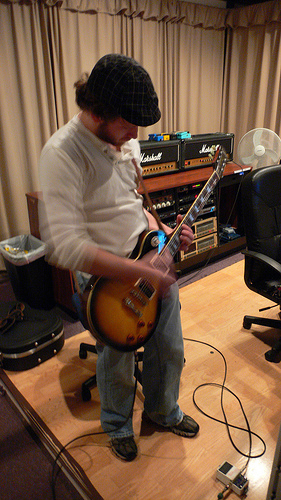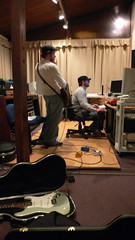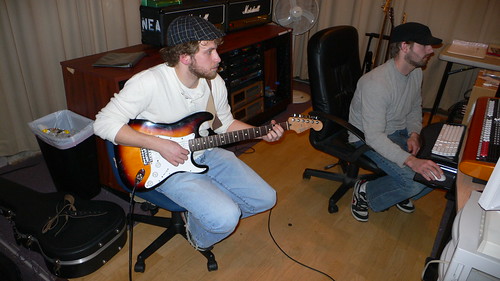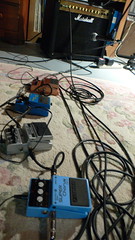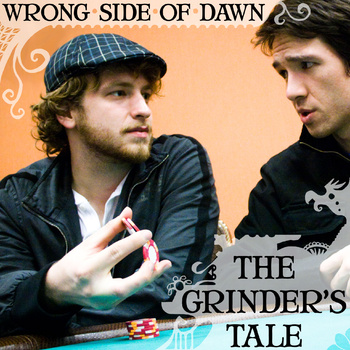 This post is the necessary outcome of a promise I recently made to Nelson: that I would write a Wrong Side of Dawn-related post this week. More specifically, it’s a promise I made to Nelson five weeks in a row, breaking it the first four times.
This post is the necessary outcome of a promise I recently made to Nelson: that I would write a Wrong Side of Dawn-related post this week. More specifically, it’s a promise I made to Nelson five weeks in a row, breaking it the first four times.
Procrastination is surely one of the culprits, but it is exacerbated by trepidation toward my proposed subject: tracing the evolution of “The Grinder’s Tale.”
The song seems ripe for examination, as it is one of the centerpieces of the eventual Stay Awake album, and lends its title to our recent “3P” preview. While the timing may be right to give the tune some background, its coming-about lacks the sort of snappy, one-paragraph-or-less description that constitutes your typical songwriting legend.
I like to read song-origin stories, and perhaps that’s why I’m prone to writing them myself, even though some of my past efforts have turned out to be better insomnia cures than anything else. A lot of the famous stories seem to describe songs which emerge from the brain whole, in a single moment. It’s as though some songs were written by the hand of God at the beginning of time, then floated slowly through the universe until certain lucky mortals stumbled upon them to transcribe them into tangible form. (“Yesterday” and “Cliffs of Dover” come to mind.)

Not so, “The Grinder’s Tale.” Even under normal circumstances, I can be shockingly verbose about an extremely simple song I wrote. But I imagine that, if I really wanted to, or were under the influence of a strong sedative, I could manage to summarize the process behind a song in less than a minute. I can’t do it for this tune, except to say that the track is the product of the accidents, frustrations, failures and false starts of at least 9 different musicians over the course of 9 nine years. That, and my consistent hardheadedness throughout the entire process. I was the one who insisted on starting the whole god-forsaken project, and also the one who insisted on finishing it. I guess I can begin with that part.
See, when I took my first guitar lessons at 15, a world of music became demystified. Geez, a chord was nothin’ but a buncha’ notes. A song nothin’ but a buncha’ chords. Simply type “[song title] tab” into Google, and even an extreme novice like me could be playing right along with a radio hit in a matter of minutes. This probably contributed to a phenomenon that I’ve discussed with several people, but Adam puts it most succinctly: “In high school, I knew more people who could play this song on guitar than people who could actually play the guitar.”
Sometimes I can’t help but reach for an old cliché about not seeing the forest for the trees. This was the opposite. A good song had always been a great forest to me, but I’d never really seen the individual pieces. I can’t identify a specific moment of clarity, but I eventually started to realize, “Wtf, man, it’s just some trees. Nothing special after all.”
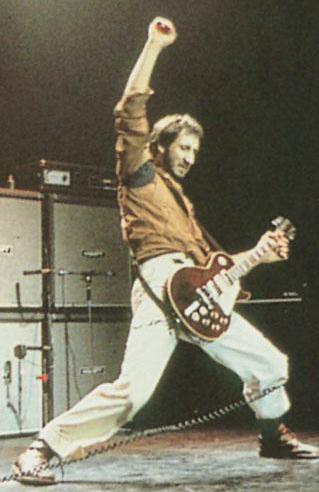
Led Zeppelin had their “Stairway to Heaven,” the Who their “Won’t Get Fooled Again,” Oasis their “Champagne Supernova,” Eric Clapton and Duane Allman their “Layla,” Don McLean his “American Pie,” Guns N’ Roses their “November Rain.” To a fan, they are demigods. To a guitarist who’s made it past the tenth lesson or so, they are a bunch of guys too arrogant and foolish to write three-minute hit singles. Their “epics” happened in front of an audience of millions. But if cockiness and foolishness is all it takes, well shit, a beginning guitarist like Brian Rose can have his own “epic” right here in his bedroom. (That sentence looked a lot less sexual in my head than it does now in print.)
Before I’d ever written a note of music, I had a silent resolution that I would someday have my own overblown epic, even if I was the only person to ever hear it. Keep this in mind. It might become significant later.
Writing for “Ohm”
At some point, I finally started trying to write material of my own, with the hopes that I, Tyler Currier, Pulsar Li, Anthony Santoro, Tom Shea, and Kunal Desai (collectively referred to as “Ohm,” by those in the know) might take to the stage with this stuff at our high school’s “Battle of the Bands.”
To be honest, I was forcing myself. Covering “Wonderwall” was so easy, and so much fun. Original material was so much goddamn work, very boring, and it never sounded any good. Other bands performed original material at the Battle of the Bands. They would rock my world with a couple masterful covers. Then the dreaded words: “OK guys, now we’re going to play you one of our originals!!!” And it would be downright unlistenable.
Though confident my “epic” would come, I was presently content just to sound good, to be fun, to be a cover band. With only a precious half-hour to do our set, why remove a Lennon/McCartney song in order to make room for an original? Their songs were better, after all. There was only one reason: the respect of other musicians. The bands with original material had it. I felt I didn’t. At least, not enough of it.
Tyler and I would work on our songs. Nobody else really had the time to spend. At first, they weren’t really our songs. I helped Tyler work on his songs, as I had yet to stumble on an idea of any worth. We agreed the songs weren’t ready yet, but they always seemed one jam session away from being finished.
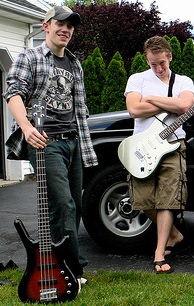
One afternoon after school, I sat alone in my basement strumming an unplugged electric guitar. I played a 4-bar chord progression thusly: E-D7-A-E. I liked the sound, and with a couple hammer-ons and strumming flourishes, I convinced myself that I was playing something completely original and utterly wonderful. I ran upstairs to present the discovery to my family. “Listen to this! It sounds like the beginning of a song!”
Untrained ears hear very few sounds that they consider special. If you can figure out what does sound special to the untrained ear, I guarantee you will be the eternal king of the music business and a multi-billionaire. A well-trained ear, after all its experience, is similarly hard to impress. Only novices (I’m not the only one to make the mistake), somewhere in the gray area between trained and untrained, can convince themselves that there is novelty in their own wholly unoriginal shit.
Therefore, I was the only person I impressed. I got some white-lie compliments from my mom. My dad and one of my siblings (I forget which), decided it was best to keep their eyes on the television and pretend they’d never noticed me coming upstairs. Defeated, I disappeared back into the basement.
By the time I got home from school the next day, my ignorant bliss had stubbornly grown back. I think I already mentioned that stubbornness is a big theme here. I had the beginnings of a killer song on my hands. It’s hotness was not perceptible to anyone else, but that wasn’t about to change my mind.
By now, you’ve figured out that I’ve got one piece of “The Grinder’s Tale” in place. And you are 100% wrong. I’ve actually just started to write “Last Warning.” And let this be a last warning to you: this really is a long story. [As a footnote, “Last Warning” sounds way different these days.]
We return to find our hero sitting in his bedroom, thoroughly convinced that his three-chord song is actually a smash hit. “Well, now that I’m just days away from finishing this classic high-energy rocker, I’m going to need a slow song, too.” Thus, “Last Warning” gives rise to “The Grinder’s Tale” as its necessary antithesis.
And I grabbed my guitar. The steps seemed clear. I had a rocker. Today, I would do slow and pretty. By the end of the week, I’d have two songs which I could present to the band as fait accompli. We’d take the stage at the Battle of the Bands, and somewhere in between “White Room” and “Baba O’Riley,” I’d say the magic words: “OK guys, now we’re going to play you one of our originals!!!” Obviously, this sentence would make everybody very sad. But I’d be a real musician after that. I probably imagined that Tyler and I would have to report to the Department of Motor Vehicles to get our pictures taken and printed on our very own Musician/Overall-Cool-Guy licenses.
Back on planet Earth, I still needed that ballad. And a ballad (something of a misuse of the term) had to be pretty. So, what’s pretty?
The beginning of “Boys of Summer” is pretty, with its never-ending keyboard melody: down a half step, then down another major third from there. The bass line moves underneath it, but this top part stays the same.
The beginning of “Sweet Child O’ Mine” is pretty, as Slash plays an arpeggio that always ends with the same melody: down a half step, then down another major third from there. The bass note moves, but this top part never changes.
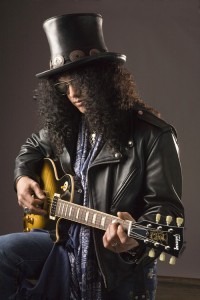
Young Brian realizes that maybe this whole songwriting thing isn’t so tough after all, and writes a simple arpeggio ending with a melody that goes down a half step, then down another major third from there. But I decided to do Slash and Don one better: instead of just changing the bass note, I would change position on the guitar and do the whole darn thing over again a few frets lower. There! I’ve improved the formula! I made it more complicated!
The Brian Rose who began writing “The Grinder’s Tale” in 2001 had a very different attitude than the guy who ultimately worked on the 2009 version. High-school-Brian considered musical complexity to be an end in itself. Unemployed-graduate-degree-Brian considers elegance a virtue, and complexity a necessary evil. High-school-Brian’s only saving grace was that he was so stupid, he successfully convinced himself that his simple (and therefore, good) riffs were actually very complicated.
I needed a chord progression. My riff was a G arpeggio. I decided the first chord would be, you guessed it, a G. This song is almost done! Two complete songs, very soon! A fast song and a slow song! (Play the current “Grinder’s Tale” recording from 6:02 to 6:11. Listen to just the guitar, and you’ll hear the entirety of what I wrote that day.)
But there was no melody. And no lyrics. I tried, but I knew I was failing. It became almost a daily routine: Write lyrics on loose leaf paper. Put paper in desk. Open desk 24 hours later and read lyrics. Vomit just a little bit in my mouth. Decide the song will have to be about a completely different subject matter. Get new sheet of loose leaf.
The material was never presented to the band. Weeks and months passed. We went on at the high school “Band-fest” (castrated of its “battle” element in order to avoid controversy) without Tom (family vacation?), and without Anthony (little brother Steve subbing for him on drums). The crowd enjoyed a fun set consisting entirely of well-known classic rock standards.
Tyler and I met for a jam session at the beginning of summer. I played my riff, which was masquerading under some title or another at the time. Before I could explain the chords, Tyler took to the bass strings and started playing along: an “e” … “d” … “c” … “a.”
“What was the bass line you wanted?”
“Uh… I think your bass line is probably better.”
I was learning a lesson that surprisingly few rock writers ever learn. You see, even in pop music, the bass is the boss. It doesn’t matter if everybody else plays exactly the same thing. Change the bass note, change everything. It’s like uprooting a house right down to its foundation, then reinserting it, whole, right into a completely different neighborhood.
We sounded good. Sometimes I try to forget what the song sounds like, and listen to the opening riff with the same ears I did then. But I can’t. I have expectations. I know what’s coming. Those harmonies will never again give my brain the shock of energy that I unexpectedly felt on that first day.
I was satisfied, but Tyler kept going, jumping octaves and throwing in embellishments.

“You can’t do that Red Hot Chili Pepper stuff in this song. It’s supposed to be a slow song!”
After listening a bit, I was converted. Tyler and I set about saving the idea to my 4-track tape recorder. Tyler played the bass riff repeatedly until he got tired of it. Then I overdubbed the guitar riff a few times, transitioning into an improvised solo. At the point where the solo began, there were 20 bars of Tyler left. When the bass stopped, I stopped. That’s really the only reason why, even now, the song’s main guitar solo is 20 bars long. (The equivalent section now runs from 0:40 to 2:00 of “The Grinder’s Tale.”)
Later, I was alone again with the 4-track. In a moment of insanity, I thought: The riff sounds good with my my chord progression on guitar. It sounds good with Tyler’s bass line. Maybe it would sound good with… both! I overdubbed my old progression. The result was actually less cacophonous than you might think, as the two progressions are actually quite close. But even I knew this sounded like gobblety-gook on the playback. I’d have to keep the two progressions in peaceful separation. The old progression as verse, new one as chorus. This was the high water mark of my “complicated equals good” attitude.
Swarthmore years
That’s pretty much all I had before I went to college and met Nelson. Nelson also fancied himself a songwriter, but he had actually finished one song. “Break Free” used some interesting rhythm guitar techniques, and was meticulously structured at 3 minutes long. And it was exactly what songwriting is supposed to be: the product of bad experiences, yet bouncy and fun nonetheless.
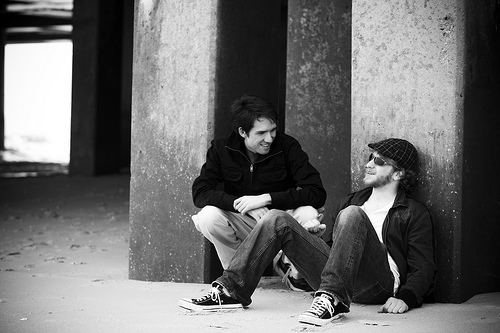
I discussed a lot of song ideas with Nelson, including my recent jam with Tyler. I mentioned to Nelson that I might want to switch my main guitar riff over to the piano. (The music building at Swarthmore is filled with piano practice rooms. Not really knowing how to play the piano, one day I had sat down and plinked out the first thing I could think of. I tried to make out the guitar riff in my right hand while playing the bass notes for Tyler’s harmony in the left hand. I wasn’t much of a pianist, but what the hell, it sounded nice.)

Nelson disagreed. “That part sounds like it’s written for guitar. If you want to write something for piano, write it like you’re writing for the piano!” Nelson set about adapting the song to be more piano-driven, including a rapid-fire 16th note version of the 8th note guitar riff. It was so fast as to be almost atmospheric, rather than a proper melody. Nelson and I recorded a demo on his 8-track digital recorder (so much easier than the 4-track tape!).
The song sat in this condition for about 3 years. Many of my musical ideas during that time were briefly considered as new sections to the old tune. It’s 6:45 length stretched out to as much as 10 minutes as I hoped to increase its “epic” scope. But the new sections were always scrapped in the end, except one, which became the first 22 seconds of the current “Grinder’s Tale.”
Still, my biggest problem was yet to be solved. No lyrics. Ideas continued to be written down and scrapped. I had moved from loose leaf over to .doc files. In three years, the only set of words I saw fit to keep was “Where Is Bobby McGee?”
A bunch of things happened in my senior year, though:
- I made a few of the first truly stupid decisions of my life. Way worse than trying to play different chord progressions at the same time. This caused me to jot down a short line, in my ever-growing Word-.doc cache, about logic and emotions leading people to opposite conclusions. It’s now the chorus of “The Grinder’s Tale.” (“What you believe is not the same as what you know.”)
- I started watching an excellent TV show called House M.D., about a character who suppresses his emotions and focuses on logic in search of the correct decision. He also has a never-ending supply of sarcastic insults for people who can’t do the same.
- I saw Ben Folds live, after which I had an epiphany about what good lyrics really are.
- And of course, there was Jeff Billion. Billion taught me how to play poker, and very nearly convinced me to move out to Las Vegas with him and give pro playing a try. I declined, but my fascination with the game continues to this day.
I wound up with a handful of lines that combined to make a song called “The Grinder’s Tale.” Here’s what I like about these lyrics: there are multiple ways to hear each line, based on whether or not you choose to take it as poker jargon. Just to give an example…
Term: “draw me out”
Poker definition: “draw out” refers to the worse hand catching a lucky card, thereby becoming the better hand.
Regular English definition: in its non-technical use, to “draw someone out” might mean to lure someone “out of their shell,” or make them reveal some sort of secret.

And then there’s the title itself, “The Grinder’s Tale.” In poker, a grinder is a moderately skilled professional who is just good enough to grind out a living against the low-stakes no0bs. But even in a non-poker sense, words like “grind” or “grinding out a living” are very rich terms. They suggest a mode of living that is simultaneously masculine and powerless at the same time.
And so the thing was finally written, I guess. A good four or five years overdue.
Wrong Side of Dawn
Nelson and I first tried to pull off some of our songs with a full band in 2007, but we were grossly ill-prepared. Being the only person who had memorized the unwieldy structure of “The Grinder’s Tale,” I attempted to conduct Nelson (guitar), Andrew (bass) and Greg (drums) through the song’s rhythm tracks. Those sessions eventually became our EP, but “The Grinder’s Tale” had not gone well, and was the first track to be abandoned.

The track was revived for our next attempt at a full LP this past December. This included my reunion with Anthony Santoro. When I wrote the first notes of this tune in high school, I imagined Santoro, an Ohm member, would be the man to drum on it. I was happy to bring him back in. It almost seemed like I hadn’t strayed too far from my original goal, after all.
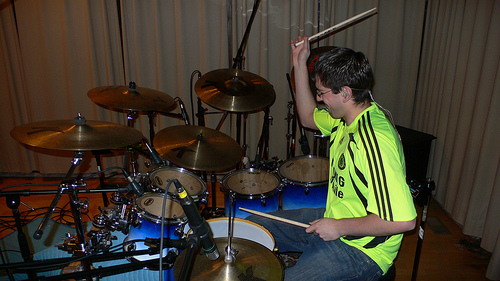
In rehearsals, I tried to explain the sort of drums that I pictured for “The Grinder’s Tale.” I handed my iPod to Anthony and had him listen to “Orange Crush” as a reference. It was the first thing that came to my mind only because I had recently pretended to play its drums myself, via Rock Band. Part way into rehearsing the song, Santoro decided he was feeling something a little bit more “Carter Beauford” in this tune. And so the drum part came to be.
After Santoro laid his drum track, Andrew Angelin came into the studio next. Though wildly creative with many of his bass tracks (see “Last Warning” or the intro to “Crossing the Bar”), Andrew was at his most deferential on “The Grinder’s Tale.” The old ideas (Tyler’s and mine) survived the session.

Gray Reinhard added the piano/organ tracks. His opening solo is the first highlight you’ll hear in the song. Between takes, Gray would play the song’s progressions and improvise to himself. “There’s not much going on towards the end,” I said. “Why not throw some of those melodies in there?” (See “The Grinder’s Tale,” 6:02 to 6:39). On the way home from the studio, I listened to that part over and over. Damn, if this wasn’t the final slap in the face. Almost nine years of trying to make this joke work, and Gray nails its punchline as an ad-lib!
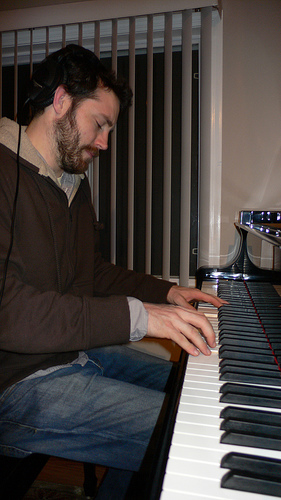
Nelson still saw changes to be made. I recorded the guitar solo as a verbatim copy of the improv I did with Tyler back in high school. Nelson disapproved. “You said you liked more emotive guitar solos. Can’t you play something more emotive?” I did a retake with a simpler, more gut-level attitude. Now Nelson approved, but needed one more change. Sensing a “Hotel California” feel at the end of the solo, he suggested it be harmonized with another guitar track. And it was done.
Nelson also thought the album, as a whole, needed more background vocals. “Good background vocals separate the professionals from the amateurs,” says Nelson. Combining ideas from Karen Rustad and I, we found a way for all three of us to sing the chorus.

Still, there was one suggestion I could not abide. Having played our rough mix for some friends with more pop-music sensibilities, Nelson returned the news that “The Grinder’s Tale” should be edited from 7 minutes down to 4 minutes.
I should have understood. I was no longer the stupid kid who wanted everything to be more complicated than necessary. In fact, I was in the middle of reading Jimmy Webb’s Tunesmith, and realizing that something like his concise “Wichita Lineman” might actually be a greater songwriting accomplishment than the sprawling and incoherent “Stairway to Heaven.” I might have understandably relented.
From somewhere in the back of my brain, a 16 year old kid came forward and said he was putting his foot down. Screw brevity and economy. The new 2009 Brian Rose might be OK with that shit, but goddammit, this kid had been waiting 9 years for his 7-minute epic. And I’ll be damned if he’s gonna give it up now.
